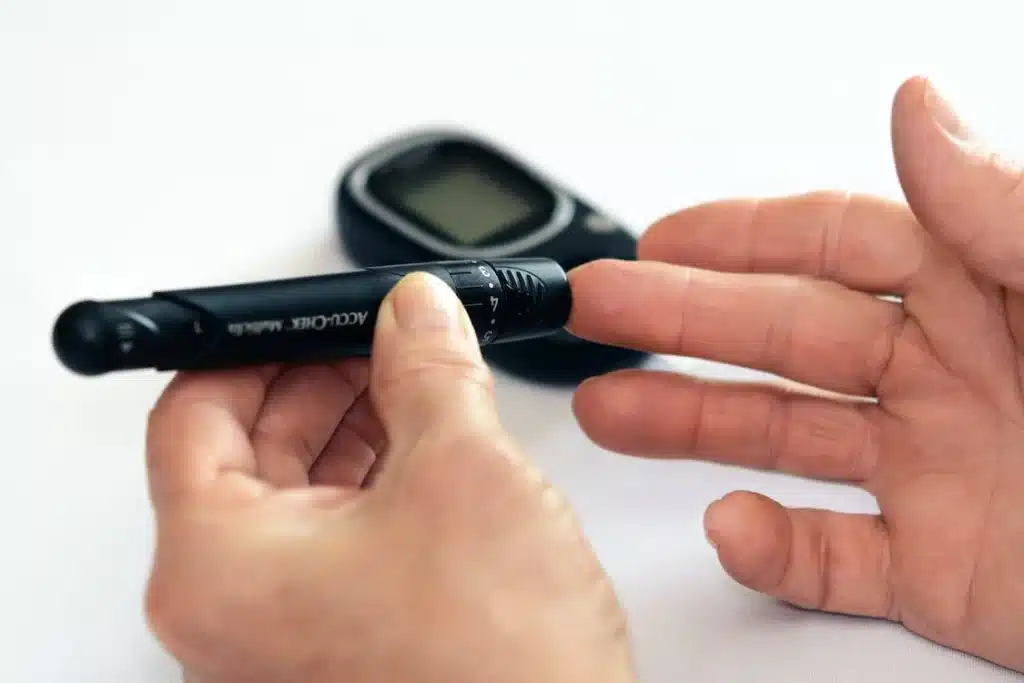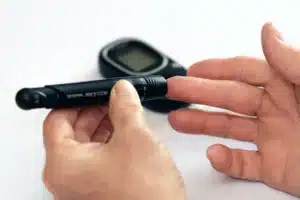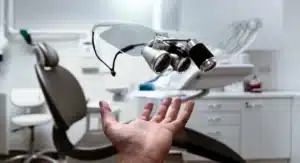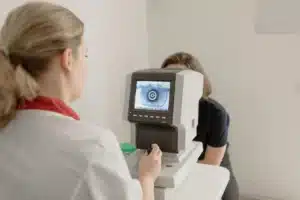Too much glucose in the blood can be very problematic to your overall health and wellness, especially when left untreated or undiagnosed. Some of the most common complications of diabetes include heart disease, kidney damage (nephropathy), and nerve damage (neuropathy).
Of all the complications of diabetes, the one that most people don’t talk about enough is the effects of diabetes on eye health. When retinal blood vessels are damaged, it can lead to vision loss, vision impairment, and even blindness if not detected, diagnosed, and treated.
So, what is diabetic retinopathy?
Diabetic retinopathy is an eye condition that’s caused by diabetes. The abnormally high levels of sugar in the blood result in damage to the blood vessels in the retina, which is located in the back of the eye. The retina converts light into an electrical signal, which is then sent to the brain.
The damaged blood vessels swell and eventually leak, which results in vision impairment or vision loss. Blood vessels can also close, which cuts off blood supply to the retina. While the eye generally forms new blood vessels, they don’t always develop properly and often leak.
The two stages of diabetic retinopathy are NPDR and PDR. In NPDR (non-proliferative diabetic retinopathy), tiny blood vessels either leak (macular edema) or close off (macular ischemia). PDR (proliferative diabetic retinopathy) is when the eye forms new, abnormal blood vessels.
What’s the Purpose of a Diabetic Eye Exam?
A diabetic eye exam is crucial to the eye health of those living with diabetes or prediabetes. These people are at an increased risk of developing diabetic retinopathy, diabetic macular edema, glaucoma, cataracts, and several other eye conditions that could result in vision loss.
Like any eye condition, early detection often leads to the best treatment. The sooner your eye doctor can diagnose the issue, the sooner they can form a treatment plan designed to help you preserve your vision for as long as possible — which is the goal behind a diabetic eye exam.
In addition to the comprehensive eye exam, there are a number of signs and symptoms of diabetic eye you can keep an eye out for yourself. These include vision impairment, vision loss, floaters or flashes of light, blurred or patchy vision, eye pain, redness in the eye, and dark spots in vision.
What Do Diabetic Eye Exams Include?
Diabetic eye exams vary in time scope, but they generally take between 30 minutes to an hour. Your eye doctor will complete a number of different tests during the eye exam, all of which are designed to take a closer look at the retina and the overall health of the eye and its structures.
First, your doctor will go over your and your family’s medical history to get a better sense of your risks and current health status. Some of the tests they’ll perform include a visual acuity test, a comprehensive dilated eye exam, a fundoscopy (back of the eye), and glaucoma testing.
What they’re looking for is to see if your visual acuity has changed since your last visit, damage to the retina, damaged or leaking blood vessels, damage to the optic nerve, swelling of the macula, or glaucoma — an increase in eye pressure, also known as intraocular pressure.
How Often Should You Schedule a Diabetic Eye Exam?
Having diabetes puts you at an increased risk of experiencing eye complications and vision problems. With a regular diabetic eye exam, your eye doctor can detect these complications in the early stages, which is necessary for early detection and the proper treatment moving forward.
How often you schedule a diabetic eye exam depends on what type of diabetes you have, how severe it is, and whether or not you’ve experienced any symptoms in the past. Your eye doctor will let you know how often to schedule an exam, but here’s a general idea of what to expect:
Type 1 Diabetes
Patients with Type 1 diabetes should schedule their first exam no longer than five years after being diagnosed, as well as every year after their initial exam.
Type 2 Diabetes
Patients with Type 2 diabetes should schedule their first exam as soon as possible after being diagnosed, as well as at least once per year after the initial exam.
Pregnant Women
Diabetes patients that are planning on getting pregnant should consult with their eye doctor beforehand, including exams before, during, and after pregnancy.
A regular diabetic eye exam could be the difference between preserving your vision and losing your vision. You should always follow your eye doctor’s directions and recommendations. The more you care for your eye health, the better chance you have at maintaining long-term health.
Do You Have Diabetes? Contact Us Today!
Diabetes affects millions of Americans on a daily basis, not only putting their health at risk but also their vision. In fact, vision is often the first part of the body affected by this disease and can lead to severe vision loss or impairment if not detected, diagnosed, and treated properly.
The good news is a diabetic eye exam can help you maintain your eye health for as long as possible. If you have diabetes, you should be scheduling a yearly eye exam — sometimes more frequently than that — with your local ophthalmologist to detect complications in the early stages.
At Milwaukee Eye Surgeons , we’re dedicated to providing best-in-class eyecare for those living with diabetes. Whether you’ve just been diagnosed with diabetes or have been living with diabetes for years now, Milwaukee Eye Surgeons is ready and willing to give you an eye exam.
We utilize the most advanced technology and best equipment to monitor your eye health. Combined with our welcoming staff and comfortable office, we ensure a positive experience for all of your clients. Contact us today to schedule an eye exam with Dr. Kenneth Weinlander, MD.







